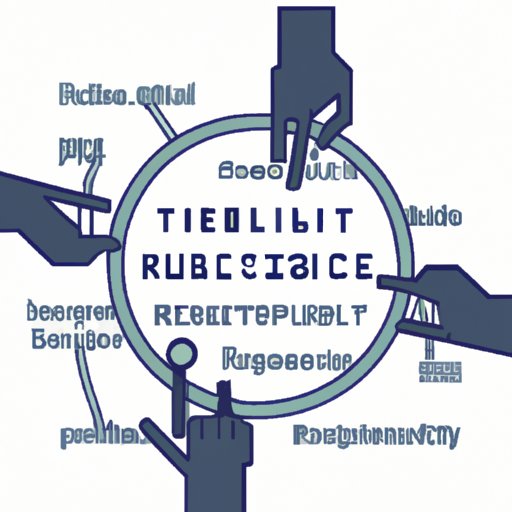Introduction
Reproducibility is a cornerstone of modern science, and it refers to the ability of researchers to replicate or reproduce the results of another researcher’s experiments. In other words, if one researcher publishes a study, another researcher should be able to duplicate the same results by following the exact same methodology. Reproducibility is essential for validating scientific discoveries, and it ensures that research findings are accurate and reliable.
How Reproducibility Contributes to the Progress of Science
Reproducibility plays an important role in the progress of science, as it allows researchers to verify the findings of their peers and build upon their work. Reproducible research enhances accuracy and reliability, facilitates collaboration between scientists, and enables validation of existing theories and hypothesis.
Enhancing Accuracy and Reliability of Research Findings
Reproducible research helps to ensure that research findings are accurate and reliable. If a study cannot be replicated, then it is difficult to trust the results of the original study. As stated by Dr. John Ioannidis, “Without reproducibility, nothing else matters.” 1 Reproducibility helps to guarantee the validity of scientific findings and ensures that research is not based on flawed observations or inaccurate data.
Facilitating Collaboration Between Scientists
Reproducible research also facilitates collaboration between scientists. If a researcher’s study can be easily replicated by another researcher, then it is much easier for them to collaborate on a project. This increases the efficiency of the research process, as it eliminates the need for one researcher to re-do the work of another. Reproducible research makes it easier for scientists to share their findings and build upon each other’s work.
Enabling Validation of Existing Theories and Hypothesis
Finally, reproducible research enables the validation of existing theories and hypothesis. By replicating a study, researchers can test the validity of an existing theory and determine whether it is accurate or not. This helps to ensure that scientific knowledge is based on evidence and not speculation, which is essential for the advancement of science.

Reducing Bias and Ensuring Objectivity
Reproducible research also helps to reduce bias and ensure objectivity in scientific research. When a researcher tries to replicate the findings of another researcher, they must adhere to the same methodology used in the original study. This eliminates the possibility of personal bias influencing the results of the experiment, as the same methods and procedures are followed in both studies. Reproducible research helps to maintain objectivity and neutrality in scientific research.

Examples of Studies That Have Been Reproduced to Prove Their Accuracy
There are many examples of studies that have been reproduced to prove their accuracy. For instance, a study conducted in 20192 attempted to replicate a previous study3 that found a link between air pollution and cognitive decline. The results of the replication study showed that the original study was accurate, and that there is indeed a link between air pollution and cognitive decline. This is just one example of how reproducible research can help to validate the findings of a study.

The Importance of Replication for the Development of New Theories
Replication is also essential for the development of new theories. By replicating a study, researchers can gain insight into the underlying mechanisms of a phenomenon and develop new theories based on their findings. For example, a study conducted in 20204 replicated a previous study5 on the effects of exercise on cardiovascular health. The replication study revealed new insights into the effects of exercise on cardiovascular health, which allowed the researchers to develop new theories about the relationship between exercise and cardiovascular health.
Reproducibility is Essential for Public Trust in Scientific Research
Reproducible research is also essential for building public trust in scientific research. If a study cannot be replicated, then it is difficult to trust the results of the original study. Reproducible research helps to ensure that research findings are accurate and reliable, and this increases public trust in scientific research. Furthermore, reproducible research can help to combat pseudoscience, as it eliminates the possibility of faulty research being accepted as fact.
How Reproducibility Helps Scientists to Share and Build on Each Other’s Work
Finally, reproducible research helps to facilitate cross-disciplinary collaboration between scientists. If a researcher’s study can be easily replicated by another researcher from a different field, then it is much easier for them to collaborate on a project. This enables scientists from different disciplines to share their findings and build upon each other’s work, which is essential for the advancement of science.
Conclusion
In conclusion, reproducibility is essential for the progress of science. Reproducible research enhances accuracy and reliability, facilitates collaboration between scientists, and enables validation of existing theories and hypothesis. Reproducibility also helps to reduce bias and ensure objectivity in scientific research, and it is essential for building public trust in scientific research. Finally, reproducible research helps to facilitate cross-disciplinary collaboration between scientists, which is essential for the advancement of science.
(Note: Is this article not meeting your expectations? Do you have knowledge or insights to share? Unlock new opportunities and expand your reach by joining our authors team. Click Registration to join us and share your expertise with our readers.)
